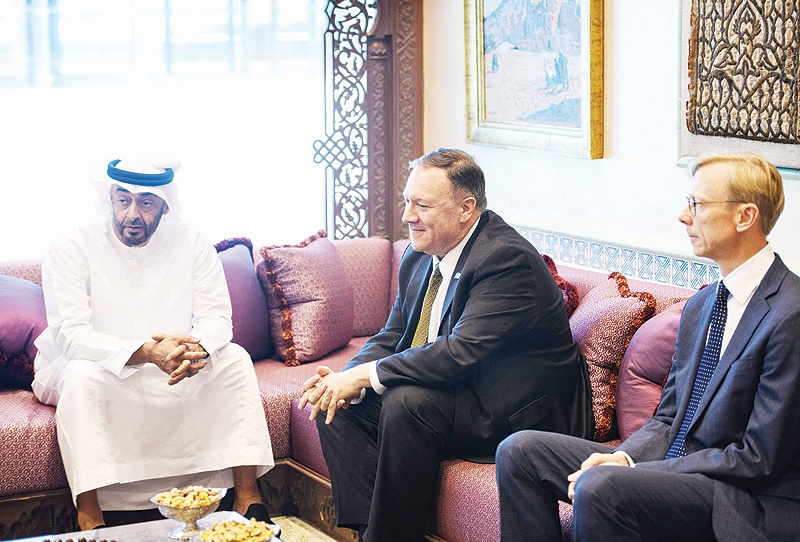Iranian FM warns US or Saudi Arabia


TEHRAN: Iran's foreign minister has said a military strike on Iran would trigger "all-out war", as the United States and its Gulf allies accuse Iran of being behind attacks on Saudi oil facilities. Asked about the consequence of "an American or Saudi military strike on Iran" in an interview with CNN aired yesterday, Mohammad Javad Zarif responded: "An all-out war."
"We don't want war, we don't want to engage in a military confrontation," he said, warning it would lead to "a lot of casualties". "But we won't blink to defend our territory," he added. Yemen's Iran-backed Houthi rebels have claimed responsibility for Saturday's strikes on Saudi oil infrastructures, but the United States says it has concluded the attack involved cruise missiles from Iran and amounts to "an act of war".
Saudi Arabia, which has been bogged down in a five-year war in neighboring Yemen, has said Iran "unquestionably sponsored" the attacks and the weapons used in them were Iranian-made, but has not directly blamed its regional rival. "They're making that up," said Zarif. "Now they want to pin the blame on Iran, in order to achieve something, and that is why I'm saying this is agitation for war." "Because it's based on lies, it's based on deception," he said. The attacks on Saudi energy giant Aramco's Abqaiq processing plant and Khurais oilfield halved the kingdom's oil output. Iran has repeatedly denied US and Saudi accusations that it arms the Houthis.
'Peaceful resolution'
US Secretary of State Mike Pompeo said yesterday US wants a peaceful solution to the crisis sparked by attacks on Saudi oil facilities, after Iran raised the prospect of "all-out war". Pompeo has blamed Iran for the dramatic weekend assault on two facilities, condemning an "act of war" which knocked out half the kingdom's oil production. The rhetoric has raised the risk of an unpredictable escalation in a tinderbox region where Saudi Arabia and Iran are locked in a decades-old struggle for dominance.
After meeting with allies in Riyadh and Abu Dhabi, Pompeo said there was an "enormous consensus in the region" that Iran carried out the attacks, despite its denials. But he said the US was intent on finding a way out of the confrontation. "We'd like a peaceful resolution. I think we've demonstrated that," he told reporters. "I hope the Islamic Republic of Iran sees it the same way." Iran's Foreign Minister Mohammad Javad Zarif earlier warned any US or Saudi military strike on Iran could cause "all-out war".
"We don't want war, we don't want to engage in a military confrontation," he told CNN in an interview aired yesterday. "But we won't blink to defend our territory." Pompeo arrived in Abu Dhabi from the Saudi city of Jeddah, where late Wednesday he met Crown Prince Mohammed bin Salman, the kingdom's de-facto ruler who has said the assault poses a "real test" of global will.
'Glass towers'
Saudi officials on Wednesday unveiled what they said were fragments of 25 drones and cruise missiles fired Saturday at the facilities in the country's east, engulfing them in flames. "The attack was launched from the north and unquestionably sponsored by Iran," defense ministry spokesman Turki Al-Maliki said, although he refused to be drawn on whether Saudi officials believed Iran directly carried out the operation.
Tehran-linked Houthi rebels in Saudi Arabia's southern neighbor Yemen have claimed responsibility, but both Washington and Riyadh have said the operation was beyond the insurgents' capabilities. French Foreign Minister Jean-Yves Le Drian also said the Houthi claim "lacks credibility". The Houthis have hit dozens of targets in Saudi Arabia, and their rapidly advancing arsenal has exposed the kingdom's vulnerability despite its vast military spending.
The Houthis said Saturday's assault was launched from three locations inside Yemen, using advanced drones with long-range capabilities. They also threatened the United Arab Emirates, a key member of the Saudi-led coalition fighting the Houthis. Spokesman Brigadier Yahya Saree said the group was ready to attack dozens of targets including the skyscraper-filled cities of Dubai and Abu Dhabi. "If you want peace and security for your facilities, and towers made of glass that cannot withstand one drone, then leave Yemen alone," he said.
'List of Iran targets'
US military planners weighing retaliation have reportedly prepared a list of Iranian targets including the Abadan oil refinery, one of the world's largest, and Khark Island, the country's biggest crude export facility, the New York Times said.
Other potential targets include missile launch sites and other assets of the elite Islamic Revolutionary Guard Corps, along with bases near the Gulf, where unusual activity suggests they had a role in the strikes. "Any strikes against Iran would almost certainly be carried out by volleys of cruise missiles from (US)Navy vessels. Strike aircraft would be aloft to carry out attacks if Iranian retaliated against the first wave," the newspaper said.
Cinzia Bianco, a Middle East analyst at the European Council on Foreign Relations, warned of "an out-of-control chain of escalatory events." "Inside Saudi Arabia, there is uncertainty over the most appropriate course of action," she said. "However the dominant thinking there points to the US targeting critical infrastructure in Iran as to minimize or exclude any human cost." Late Wednesday, CBS News cited an unnamed US official saying Iran's supreme leader Ayatollah Ali Khamenei had approved the attack, on condition it be carried out in a way that would allow Iran to deny involvement.- Agencies

